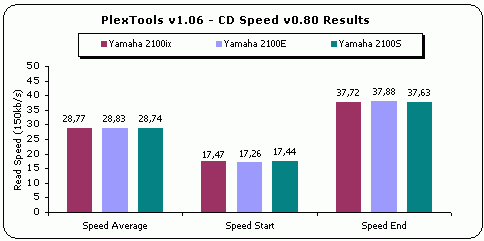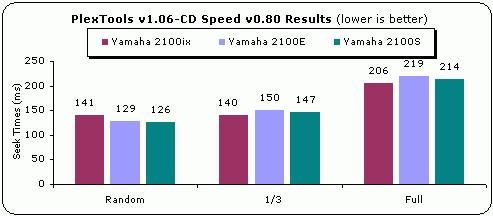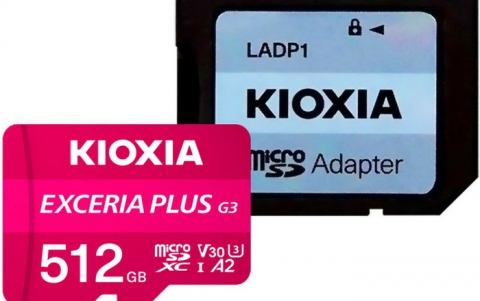Yamaha CRW2100IX CD-RW
3. Data Tests
Yamaha CRW2100ix FireWire CDR-W- Page 3
Data Tests
Test Method:
- SCSI Mechanic v3.0.224: This was used to compare the Yamaha's I/O
performance against other various CDR-W drives (see charts). We used a pressed
CD containing PlexTools v1.06 for all of the tests.
- CD Speed 99 v0.80 was also used to check the drive performance with
pressed CDs. For that test we used PlexTools v1.06 original CD.
- SCSI Mechanic v3.xx results:

We decided to compare all three Yamaha models (CRW2100S/E/IX) between them, to make clear what (and how big) the differences are. As you can see from the graph above, the CRW2100ix goes pretty well into the Average Random I/O throughput, compared to the other two models - The IDE model though leads the race with a minimal difference. In the Average Seq. Throughput it comes last, while in the last test (Average Same Sector I/O) really shows it's teeth to all the contestants. We believe that the newer Firmware revision (1.0n) and/or the FireWire protocol is resposible for this.
- CD Speed 99 v0.80 results:

Using CD Speed 0.80, we can see that the CRW2100ix clearly is in the middle of the chart leaving back the SCSI model, but not the IDE one.

The CRW2100ix performs very well and seems to be able to compete the other two Yamahas in the Full seek test, while in the 1/3 test leaves them back. Finally, in the Random seek test is left behind by both the IDE and SCSI models.
Verdict of data (pressedCDs) tests:
Yamaha CRW2100S and CRW2100E recorders belong to the list with the fastest
16x CDR-Ws drives you can buy, and the FireWire model couldn't have been an
exception. Its average reading speed using PlexTools v1.06 was 28.77x,
while the other drives were a bit faster. It's 'Full' Seek times were better
than both other drives while it was second best on '1/3' and last at 'Random'.
In the SCSI Mechanic tests, the CRW2100ix delivers a pretty good performance
in the "Average Random I/O" test and is left behind by the IDE model
by 1kb/s which is not a difference really. The drive delivered an average sequential
reading result of 4.229mb/s, which is *a bit* lower than the other two. Where
the drive is 'the best' is in the "Average Same Sector I/O" test.
The drive itself is an excellent reader. As far as it concerns the FireWire
protocol, which it uses, it seems to be a fair competitor to both other solutions
(IDE / SCSI).













